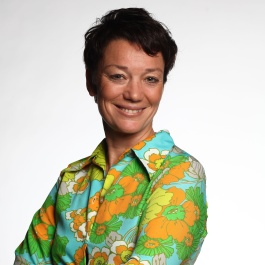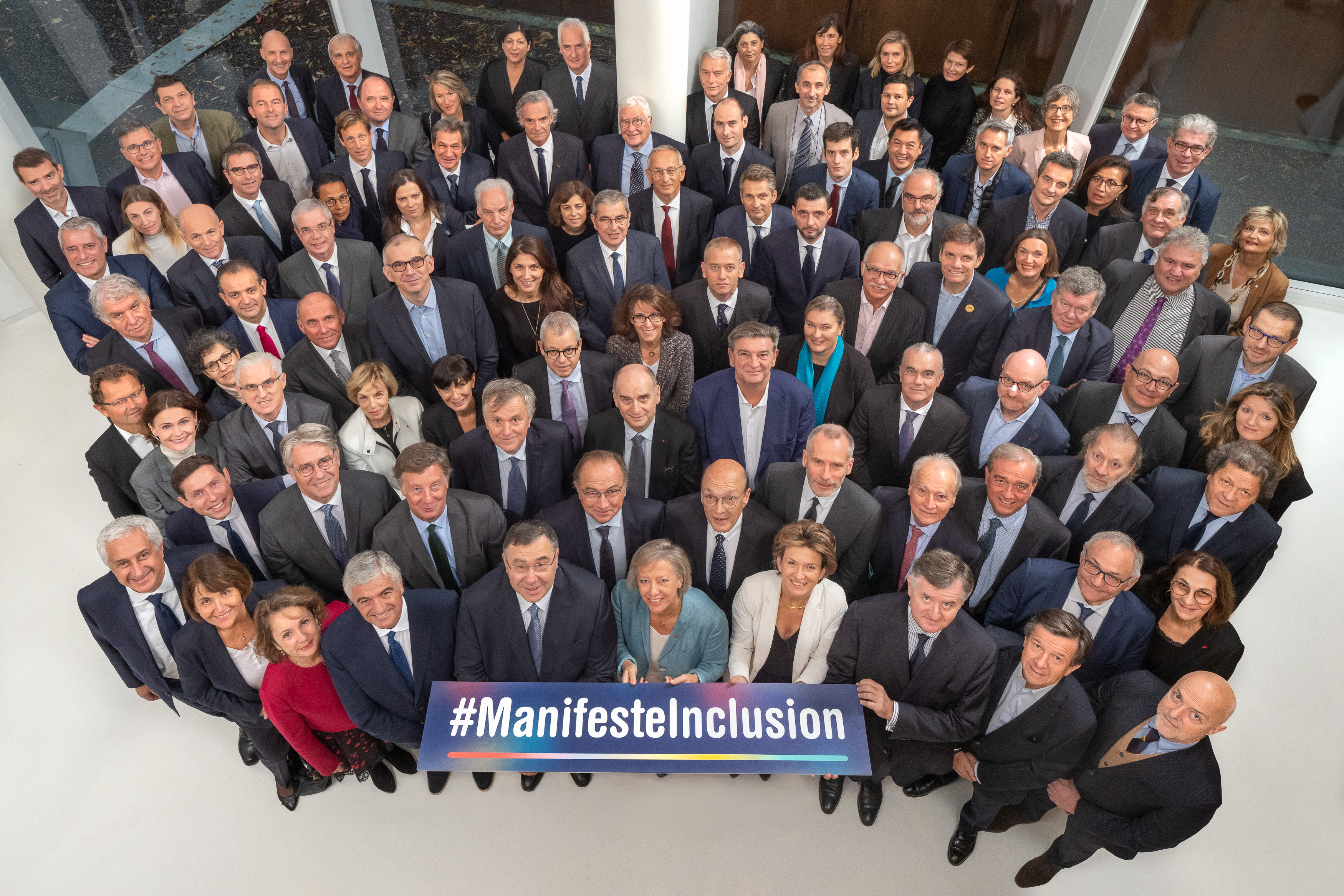
CECILE MONTHIERS EN

Head of Talent Development at the TF1 group
How long has the Group been engaged on the themes of diversity/inclusion within the company ?
For many years! The first step was the creation of the TF1 Foundation in 2008, and then of our Disability Mission. Signing the Group’s first disability agreement was also a turning point. Then there was the Diversity label (TF1 was the first media company to obtain the Diversity label, in 2010) and its renewal a few years later. So we naturally became engaged proactively in all aspects of diversity: gender balance, disability, social mobility, and LGBT+ issues.
What is exciting about the challenge of inclusion within the TF1 group is that we are committed to achieving more diversity in our broadcasting output at the same time as we are investing in staff awareness and development programmes.
So the more our output drives our mission to “positively inspire society”, the more proud and engaged we are within the company.
What is the Group doing as regards gender balance ?
Since 2012, we have signed (and renewed) a workplace gender equality agreement and engaged in a corporate gender balance development programme: Mixité et Performance (“Gender Balance and Performance”). The programme has three aspects: promoting a gender balance culture, developing assertiveness among female staff, and measuring and piloting our gender balance ambition. This programme, co-constructed by our employees and our HR department, gave rise to the Fifty Fifty mixed network, alongside female leadership training courses, internal and cross mentoring programmes (75% of our female staff have been mentored), and the incentivisation of senior management on gender balance objectives. We have made significant progress in this area, having moved from 28% of women on our Management Committee in 2015 to 47% today. On mentoring, 50% of mentored female staff have changed job or been promoted within three years of being mentored. We have just won the 2021 Grand Prix Humpact award for Gender Balance.

Gender balance affects all aspects of what we do. We are making a substantial effort to increase the presence of women in some sectors such as IT and technical, and to increase the proportion of men in areas like PR, human resources and law, etc.
Similar efforts are being made in broadcasting where, for example, our News division has developed the Expertes à la Une programme, which aims to increase the presence of female experts in our news bulletins. We are also investing in programmes which carry strong messages, like Le Bazar de la charité, and in diversity and inclusion in their broadest sense.
On LGBT+, what are our commitments ?
The TF1 group was the first media group to sign the Autre Cercle LGBT+ Charter in 2015, sponsored by TF1 presenter Christophe Beaugrand, who is an outspoken advocate for LGBT+ rights.
Signing this Charter formalised our ambition to outlaw discrimination on grounds of sexual orientation or identity. It made it clear that our agreements relate to all kinds of couples, parents and partners. Even before the law was changed, TF1 extended parental leave for the second parent to four weeks. Every year, staff put themselves forward as role models, to promote the visibility of LGBT+ professionals and encourage respect for their diversity.
Here too our broadcast output reflects these themes, with dramas like Il est elle.
The TF1 group has a proactive policy against sexism and sexual harassment in the workplace. Do you think things really are changing ?
The TF1 group is a signatory of the #StopE pledge to fight casual sexism in the workplace and the PFDM Charter against sexual harassment and sexist behaviour. We take this very seriously, setting up a specific whistle-blowing procedure and training employee representatives as sexual harassment liaison officers. In addition, victims can receive specialist psychological support. We also conduct regular staff awareness initiatives (Masterclass, e-Learning, leaflet, articles).
To accelerate consciousness-raising among our staff and managers on the issue of stereotyping, we provide training on inclusive management, helping them understand stereotypes and avoid micro-aggressions so that they can play an active role in preventing casual sexism and developing a respectful work environment.
People have become much more aware of this in recent years through the #MeToo movement, which has freed people to speak out, and we should support this movement.

Does TF1 have a long track record in promoting social mobility ?
The TF1 Foundation, headed up by Samira Djouadi, plays a very important role. Every year for the last 14 years the Foundation has welcomed a group of youngsters from deprived urban areas on work/study arrangements with the aim of putting their feet on the first rung of the ladder in our business. Throughout their time at TF1 the youngsters are accompanied by a tutor so they can learn how companies work and develop their skills. Some of them are subsequently hired by TF1. The aim is for 100% of them to develop their skills and increase their employability in our industry.
The Foundation also helped create and develop Tous en stage (“Internships for All”), organised by a corporate collective to enable school students from deprived urban areas to fill internships at prestigious companies.
TF1 helps the charity La chance au concours which assists youngsters from deprived areas to access the leading journalism schools. We also partner Sport dans la ville, a charity which helps young people to integrate socially and professionally.
On the broadcasting side, issues around racial and social equality are addressed in the series Je te promets.

The TF1 group also has a proactive policy on disability.
This is an area where we are aiming high. Currently, 4.59% of our employees have a disability. For many years we have had a policy guaranteeing equal treatment for all and flagging up all forms of discrimination. This has involved signing our 5th Disability Agreement (2020-2022), which sets out the conditions for a proactive policy of employing and training disabled workers. Since 2019 we have also been signatories of the Manifesto for the inclusion of disabled people.

TF1’s Disability Mission, headed up by Céline Gaxatte, has been active for more than 12 years in developing the recruitment, integration and continuing employment of disabled workers, including adapting their jobs or working conditions to put them on a level playing field (such as organisational adjustments, hearing aids, special screens and chairs).
In 2021, 15 disabled youngsters were recruited on work/study arrangements or as interns. Our aim is to support them as they build their skills, to give them a chance of joining the company or our ecosystem.
At the same time we are carrying out awareness-raising events, such as the recent round table on disabling illnesses like cancer, diabetes and dyslexia which may require adjustments to people’s jobs or working conditions, sometimes temporarily. These illnesses affect all of us directly or indirectly (as managers or colleagues) during our career.
Our objective is to develop in-house training so that we can provide maximum support to the staff concerned, and to publicize what we are doing externally for the benefit of future employees.

Our Disability Mission regularly visits schools which provide training in the skills we use in our business. The aim is to sensitize students who are still under-informed about disability and the benefits of registering as disabled, given that good working conditions are essential to enable disabled students to study and access the careers they aspire to.
As part of the Bouygues BeYourself programme, we are also supporting Yvan Wouandji, a blind football star who lost his eyesight at the age of ten and won a silver medal in the London Olympics in 2012. His personality and life journey, and his optimism, ambition and achievements, make him a strong role model.

On the broadcasting side, dramas like Mention particulière and Les bracelets rouges have helped raise awareness.
>> To find out more about disability, see the interview with Céline Gaxatte, head of TF1’s Disability Mission.
We believe that we all have a duty to help prevent all forms of exclusion and develop inclusion among our people. Our diversity is a strength because it provides multiple points of view, enriches thinking, helps to achieve paradigm shift, and supports staff performance and engagement. We want to make our Group a special place where all talents can express themselves, whatever their gender, sexual orientation, disability or origin. Because together, on equal terms, we can develop the best content and continue to “positively inspire society”.